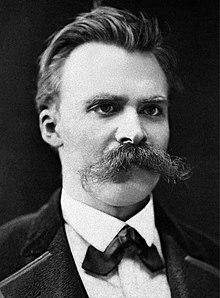 Global Information
Global InformationFriedrich Nietzsche information
Friedrich Nietzsche | |
|---|---|
 Nietzsche in Basel, Switzerland, c. 1875 | |
| Born | Friedrich Wilhelm Nietzsche 15 October 1844 Röcken, Province of Saxony, Prussia, German Confederation |
| Died | 25 August 1900 (aged 55) Weimar, Saxe-Weimar-Eisenach, German Empire |
| Resting place | Röcken Churchyard |
| Alma mater |
|
| Era | 19th-century philosophy |
| Region | Western philosophy |
| School |
Other schools
|
| Institutions | University of Basel |
Main interests |
|
Notable ideas |
|
| Signature | |
Friedrich Wilhelm Nietzsche (/ˈniːtʃə, ˈniːtʃi/ NEE-chə, NEE-chee,[10] German: [ˈfʁiːdʁɪç ˈvɪlhɛlm ˈniːtʃə] ⓘ or [ˈniːtsʃə];[11][12] 15 October 1844 – 25 August 1900) was a German philosopher. He began his career as a classical philologist before turning to philosophy. He became the youngest person to hold the Chair of Classical Philology at the University of Basel in 1869 at the age of 24, but resigned in 1879 due to health problems that plagued him most of his life; he completed much of his core writing in the following decade. In 1889, at age 44, he suffered a collapse and afterward a complete loss of his mental faculties, with paralysis and probably vascular dementia. He lived his remaining years in the care of his mother until her death in 1897 and then with his sister Elisabeth Förster-Nietzsche. Nietzsche died in 1900, after experiencing pneumonia and multiple strokes.
Nietzsche's work spans philosophical polemics, poetry, cultural criticism, and fiction while displaying a fondness for aphorism and irony. Prominent elements of his philosophy include his radical critique of truth in favour of perspectivism; a genealogical critique of religion and Christian morality and a related theory of master–slave morality; the aesthetic affirmation of life in response to both the "death of God" and the profound crisis of nihilism; the notion of Apollonian and Dionysian forces; and a characterisation of the human subject as the expression of competing wills, collectively understood as the will to power. He also developed influential concepts such as the Übermensch and his doctrine of eternal return. In his later work, he became increasingly preoccupied with the creative powers of the individual to overcome cultural and moral mores in pursuit of new values and aesthetic health. His body of work touched a wide range of topics, including art, philology, history, music, religion, tragedy, culture, and science, and drew inspiration from Greek tragedy as well as figures such as Zoroaster, Arthur Schopenhauer, Ralph Waldo Emerson, Richard Wagner, and Johann Wolfgang von Goethe.
After his death, Nietzsche's sister Elisabeth became the curator and editor of his manuscripts. She edited his unpublished writings to fit her German ultranationalist ideology, often contradicting or obfuscating Nietzsche's stated opinions, which were explicitly opposed to antisemitism and nationalism. Through her published editions, Nietzsche's work became associated with fascism and Nazism. 20th-century scholars such as Walter Kaufmann, R. J. Hollingdale, and Georges Bataille defended Nietzsche against this interpretation, and corrected editions of his writings were soon made available. Nietzsche's thought enjoyed renewed popularity in the 1960s and his ideas have since had a profound impact on 20th- and early 21st-century thinkers across philosophy—especially in schools of continental philosophy such as existentialism, postmodernism, and post-structuralism—as well as art, literature, poetry, politics, and popular culture.
- ^ See, for example:
- "Some interpreters of Nietzsche believe he embraced nihilism, rejected philosophical reasoning, and promoted a literary exploration of the human condition, while not being concerned with gaining truth and knowledge in the traditional sense of those terms. However, other interpreters of Nietzsche say that in attempting to counteract the predicted rise of nihilism, he was engaged in a positive program to reaffirm life, and so he called for a radical, naturalistic rethinking of the nature of human existence, knowledge, and morality." Wilkerson, Dale. "Friedrich Nietzsche". Internet Encyclopedia of Philosophy. ISSN 2161-0002..
- "Nietzsche's increasing determination, however, in his later writings, to avoid philosophical nihilisms of every variety, leads him to wonder whether it might not be possible to achieve an understanding of what fuels the foregoing dialectic of a sort that would allow one to head in an altogether different philosophical direction." Conant, James F. (2005). "The Dialectic of Perspectivism, I" (PDF). Sats: Nordic Journal of Philosophy. 6 (2). Philosophia Press: 5–50.
- ^ Brennan, Katie (2018). "The Wisdom of Silenus: Suffering in The Birth of Tragedy". Journal of Nietzsche Studies. 49 (2): 174–193. doi:10.5325/jnietstud.49.2.0174. JSTOR 10.5325/jnietstud.49.2.0174. S2CID 171652169.
- ^ Dienstag, Joshua F. (2001). "Nietzsche's Dionysian Pessimism". American Political Science Review. 95 (4): 923–937. JSTOR 3117722.
- ^ Perez, Rolando (2015). "Nietzsche's Reading of Cervantes' "Cruel" Humor in Don Quijote" (PDF). EHumanista. 30: 168–175. ISSN 1540-5877..
- ^ Nietzsche self-describes his philosophy as immoralism, see also: Laing, Bertram M. (1915). "The Metaphysics of Nietzsche's Immoralism". The Philosophical Review. 24 (4): 386–418. doi:10.2307/2178746. JSTOR 2178746.
- ^ Schacht, Richard (2012). "Nietzsche's Naturalism". Journal of Nietzsche Studies. 43 (2). Penn State University Press: 185–212. doi:10.5325/jnietstud.43.2.0185. S2CID 169130060.
- ^ Conway, Daniel (1999). "Beyond Truth and Appearance: Nietzsche's Emergent Realism". In Babich, Babette E. (ed.). Nietzsche, Epistemology, and Philosophy of Science. Boston Studies in the Philosophy of Science. Vol. 204. Dordrecht: Springer. pp. 109–122. doi:10.1007/978-94-017-2428-9_9. ISBN 978-90-481-5234-6.
- ^ Doyle, Tsarina (2005). "Nietzsche's Emerging Internal Realism". Nietzsche on Epistemology and Metaphysics: The World in View. Edinburgh University Press. pp. 81–103. doi:10.3366/edinburgh/9780748628070.003.0003. ISBN 978-0748628070.
- ^ Kirkland, Paul E. (2010). "Nietzsche's Tragic Realism". The Review of Politics. 72 (1): 55–78. doi:10.1017/S0034670509990969. JSTOR 25655890. S2CID 154098512.
- ^ Wells, John C. (1990). "Nietzsche". Longman Pronunciation Dictionary. Harlow, UK: Longman. p. 478. ISBN 978-0-582-05383-0.
- ^ Duden – Das Aussprachewörterbuch 7. Berlin: Bibliographisches Institut. 2015. ISBN 978-3-411-04067-4. p. 633.
- ^ Krech, Eva-Maria; Stock, Eberhard; Hirschfeld, Ursula; Anders, Lutz Christian (2009). Deutsches Aussprachewörterbuch [German Pronunciation Dictionary] (in German). Berlin: Walter de Gruyter. pp. 520, 777. ISBN 978-3-11-018202-6.